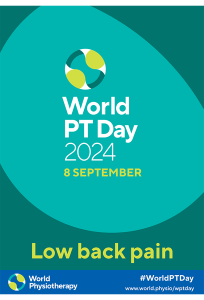World Physiotherapy Day: An Exclusive Interview with Ruth Obubu
Physiotherapy is cost-effective, and holistic in its approach,
and can address not only the Curative aspect but Preventive, Rehabilitative, and even End-of-Life aspects of patient care.
Via: David Oletu (DCM)
World Physiotherapy Day unites physiotherapists around the globe, it supports the goals of the World Health Organisation (WHO),
and it is a day to celebrate the work of physiotherapists for contributing to better outcomes and improved lives.
As we commemorate World Physiotherapy Day, we join forces with the United Nations to raise awareness about the vital role of physiotherapy in transforming lives.

In this special feature, we sit down with Ruth Obubu, an outstanding physiotherapy graduate from the University of Benin – Nigeria,
to delve into the world of physiotherapy and explore its significance in addressing various health challenges.
With a passion for improving physical function and well-being, Ruth shares her insights on the importance of physiotherapy,
debunking common misconceptions and highlighting its potential to make a meaningful impact on global health, particularly in Africa.
World Physiotherapy Day: An Exclusive Interview with Ruth Obubu ( World Physical Therapy Day – Wikipedia )
DCM: Can we meet you? Tell us about your journey in school pursuing the physiotherapy line of career.
Ruth: Hello, my name is Ruth Oritsebemigho Obubu, and I am the first of three children in my family.
I am a compassionate and dedicated individual who is passionate about serving God and humanity.
Throughout my academic journey, I have actively sought out opportunities to make a positive impact in my community.
I have volunteered for various roles, including the welfare and academic teams in my department,
and have also been involved with the ‘Friends of Nature Network.’
Additionally, I have held leadership positions in the Christian Association of Physiotherapy Students,
serving as both Secretary General and Vice President and as the Bible Study Secretary in church.
Through these experiences, I have developed a strong sense of purpose and a commitment to using my skills and talents to make a difference in the lives of others.
World Physiotherapy Day: An Exclusive Interview with Ruth Obubu
DCM: How do you think physiotherapy contributes to the healthcare system?
Ruth: Physiotherapy is a healthcare profession concerned with human function and movement and maximising potential.
It helps people develop, maintain, and restore maximum movement and function.
Also, It is important in pain and inflammation management, in recovery from injuries, illnesses, or surgeries,
in improving mobility, strength, and flexibility, and in enhancing overall well-being and quality of life.
Physiotherapy is cost-effective, and holistic in its approach,
and can address not only the curative aspect but preventive, rehabilitative, and even end-of-life aspects of patient care.
DCM: Can you explain the role of physiotherapy in preventive care? How can it help prevent injuries and diseases?
Ruth: Preventive care simply has to do with the prevention of illnesses and reducing the risk of developing chronic diseases.
Physiotherapy plays a significant role in preventive care by identifying risk factors, promoting a healthy lifestyle, preventing injuries,
enhancing physical activity, managing chronic conditions, reducing fall risk, and providing education on ergonomics and posture.
By educating individuals on the preventive role of physiotherapy, people can take proactive steps to prevent injuries and diseases.
Learning about proper posture, fall prevention, healthy lifestyle habits,
and regular check-ups can empower individuals to reduce their risk of developing chronic diseases and promote overall well-being.
Through physiotherapy, people can gain the knowledge and skills to maintain optimal physical function, prevent health issues, and enjoy a healthier life.
World Physiotherapy Day: An Exclusive Interview with Ruth Obubu
DCM: What are some common conditions that physiotherapy can manage or treat?
Ruth: Physiotherapy can manage or treat a wide range of conditions, like:
Musculoskeletal disorders (e.g., back pain, neck pain, strains, sprains, arthritis),
Neurological conditions (e.g., stroke, spinal cord injuries, Parkinson’s disease, neuropathies),
Cardiovascular conditions (e.g., heart failure, coronary artery disease),
Respiratory conditions (e.g., asthma, pneumonia, chronic bronchitis),
Paediatric conditions (e.g., cerebral palsy, Down syndrome, developmental delays),
Sports-related injuries (e.g., concussions, ligament sprains, muscle strains, tendinitis),
Post-surgical conditions (e.g., joint replacements, fractures, amputations),
Chronic conditions (e.g., diabetes, obesity, chronic pain),
Women’s health conditions (e.g., pelvic floor dysfunction, incontinence, prenatal and postnatal care),
Geriatric conditions (balance and fall prevention, osteoporosis, age-related mobility issues).
DCM: How can physiotherapy address global health concerns, such as ageing populations and chronic diseases?
Ruth: Physiotherapy can promote healthy ageing by providing exercise and lifestyle programs that improve mobility, balance, and strength.
This can help older adults maintain their independence, reduce their risk of falls, and manage age-related conditions like osteoporosis and dementia.
In addition, physiotherapy can also help manage chronic diseases like heart disease, diabetes, and respiratory diseases.
Physiotherapists can implement exercise programs that improve cardiovascular health,
increase physical activity, and enhance self-management skills for chronic conditions.
World Physiotherapy Day: An Exclusive Interview with Ruth Obubu
DCM: You will agree with me that a lot of people do not know about physiotherapy.
How can we promote greater awareness and understanding of physiotherapy among the general public?
Ruth: Yes, I agree that physiotherapy is not popular in Nigeria.
People still have a lot of misconceptions about the profession.
Some measures have been put in place to address this issue,
like education and outreach programs, campaigns, collaboration with healthcare professionals, community events and workshops, and so on.
I think that patient testimonials should be added to these measures.
Physiotherapists should encourage patients to talk to other people in their communities about the benefits of physiotherapy.
It will help the profession gain more ground.
DCM: Why is World Physiotherapy Day this important?
Ruth: World Physiotherapy Day, celebrated on September 8th, is important to raise awareness and promote the profession.
It unites physiotherapists around the globe, it supports the goals of the World Health Organisation (WHO),
and it is a day to celebrate the work of physiotherapists for contributing to better outcomes and improved lives.
World Physiotherapy Day: An Exclusive Interview with Ruth Obubu
DCM: You recently won ‘The Prof. & Mrs. J. A. Balogun’s Award;

for the Best Student With Independent Research Study (Dissertation)’ on physiotherapy during your sworn-in ceremony into the physiotherapist field at the University of Benin.
Such a research study must be relevant to society. I’m curious to know. Give us an overview of it.
Ruth: My research topic was;
‘The Influence of Work-Related Stress on Sleep Quality and Quality of Life of Healthcare Practitioners in the University of Benin Teaching Hospital.’
It is a mouthful, right?
I was motivated to study this topic because I saw that some healthcare workers looked tired and stressed.
However, I focused on house officers, intern pharmacists, and intern medical laboratory scientists who work long hours without enough sleep.
This affects their personal life and ability to care for patients.
I wanted to find out what problems they face and suggest ways to make their lives better so they can provide the best care for their patients.
DCM: Could you also share with us your unforgettable testimony of God’s faithfulness and Grace in your life, academics, and career?
Ruth: I’ll start by saying God is so faithful; he never goes back on his words.
It is very important that when you receive words from God, you run with them.
There are so many testimonies of God’s faithfulness, from the days I had no food and God provided to the time I couldn’t pay school bills, and He came through for me.
I remember how I told God at the beginning of my final year that I was going to participate in every FYB event organised in school and church,
even when I didn’t have money, and I was able to do them.
Even with the stress of data collection for my project and data analysis, I was still able to work (I clean houses and make hair), serve in various capacities,
and did very well in my exams because I held on to God’s word.
Also, in my exams from 100 level to 500 level, I was able to write with God’s help, avoid malpractice,
and I never had a carryover in school.
It was all God, and I’m forever grateful to him and for the men he put in my life.
DCM: Do you have any other things you wish to tell us?
Ruth: Company matters!
Who are those in your circle?
It is important that you have the right people around you to help you when the going gets tough.
Be hard-working, and above all, hold on to God, follow his directions, and stay in his will. He loves and cares for you!
DCM: Thank you for your time, Ruth!
Ruth: My pleasure!
Thank you too.
Also Read: Not by Might – Kathryn Johanna Kuhlman – Diademng (thediademng.org)
World Physiotherapy Day: An Exclusive Interview with Ruth Obubu

















I was recommended this website by my cousin I am not sure whether this post is written by him as nobody else know such detailed about my difficulty You are wonderful Thanks